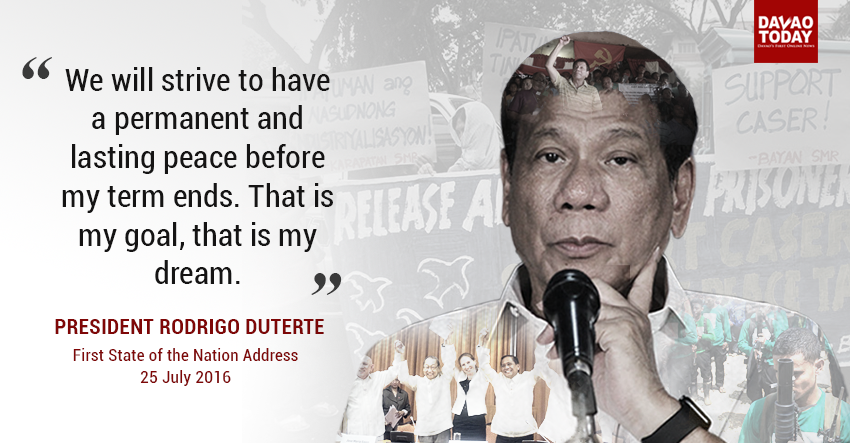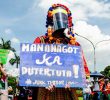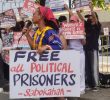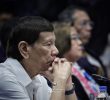DAVAO CITY, Philippines — President Rodrigo Duterte said he dreams of having permanent and lasting peace before his term ends during his first State of the Nation Address last year.
To push for the peace process, Duterte announced a unilateral ceasefire effective immediately on July 25. Back channel talks were held between the government peace panel and the National Democratic Front, the political wing of the Communist Party of the Philippines, even before the first SONA.

“To the CPP/NPA/NDF, let us end these decades of ambuscades and skirmishes. We are going nowhere. And it is getting bloodier by the day,” Duterte said almost a year ago at his rostrum at the Batasang Pambansa.
“All of us want peace, not the peace of the dead, but the peace of the living. We express our willingness and readiness to go to the negotiating table, and yet we load our guns, fix our sights, pull the trigger. It is both ironic and tragic – and it is endless,” Duterte said.
Duterte in his speech in Malacañang recently said his declaration of a unilateral ceasefire shows his sincerity to forge a peace pact with the communists, to whom he once had a close relationship during his stint as the city mayor of Davao City for more than two decades.
The peace talks further advanced as 19 NDF consultants were freed prior to the start of the first round of formal talks in August. The consultants include Benito and Wilma Tiamzon, leaders of the Communist Party of the Philippines.
Setbacks of the peace process
But the talks have suffered setbacks as both Parties questioned the sincerity of both sides.
The government wants the New People’s Army to stop its attacks against government troops and stop collecting revolutionary tax, the same tax which Duterte told businesses four years ago to pay it since it’s “a reality.”
Meanwhile, the communists said the government ceasefire does not exist in the countryside where communities tagged as rebel strongholds are attacked. The CPP said the ceasefire gave license to the government troops to attack their bases.
A few days following the conclusion of the third round of the formal talks, on February 1, the CPP ordered to lift its ceasefire effective onFebruary 10 because of the continuing military offensives and the unfulfilled promise to release all political prisoners.
But Duterte lifted the ceasefire earlier on February 3 after government troops were killed by the NPAs in Bukidnon.
That was the first time Duterte decided to terminate talks with the Reds.
The pronouncement was followed by the arrest of an NDFP consultant and the government announced that it will terminate the Joint Agreement on Safety and Immunity Guarantees which protects peace negotiators from arrest and attacks.
Backchannel talks
Negotiators, meanwhile, kept the talks going through back channels.
The formal talks were put back on track with Duterte announcing his openness to resume talks after a month he announced the lifting of the ceasefire.
“Andam ko makigstorya sa mga rebelde. Ayaw lang nang mga killer, kanang mga… Andam ko makigstorya. Andam pud ko na muundang ta ug giyera. Mas gusto nako wala tay gyera. Pero kinahanglan magstorya tag kinasingkasing permero,” Duterte told reporters when he visited wounded troopers in an Army camp in Cagayan de Oro City.
(I’m open to talk to the rebels, just not the killers. I’m ready to talk and I’m ready to stop this war. I would prefer for us to not have war, but we need to talk from the heart.)
The GRP and NDFP were able to pull off the fourth round of talks sans a unilateral ceasefire. But the fourth round of talks got delayed after President Duterte directed his peace negotiators that there should be a silencing of the guns to have an enabling environment for the negotiations.
Milestones, breakthroughs
Despite the challenges, the Parties came up with an Agreement on an Interim Joint Ceasefire on the fourth round of talks.
The agreement was considered a “major breakthrough” in the peace process, said GRP chief negotiator Silvestre Bello III. The agreement directs the respective Ceasefire Committees to meet “in-between formal talks, to discuss, formulate, and finalize the guidelines and ground rules for the implementation of this agreement.”
The guidelines will include rules governing the presence of armed units and elements of both Parties in local communities and the creation of buffer zones.
The Parties shall also have an agreement on “prohibited, hostile, and provocative acts.”
The NDFP clarified that the signing of the agreement will not go against their principle of agreeing to a ceasefire before reforms are achieved.
NDFP peace panel chair Fidel Agcaoili said both Parties already have their respective drafts on joint bilateral ceasefire. He said they will work out on the signing of the bilateral ceasefire agreement depending on the developments of the CASER.
It was just among the achievements of the peace process under President Duterte, who declared himself as a Socialist, the first President from the Left.
Under his leadership, the talks already reached four rounds in less than a year. The Parties have agreed on accelerating the talks on social and economic reforms by creating bilateral teams to tackle on issues and work on proposals even outside the formal talks.
Recently, the bilateral teams gained “positive advances”, according to Randall Echanis, a member of the NDFP Reciprocal Working Committee on Social and Economic Reforms.
He said the bilateral teams finished tackling “about 60 to 70 percent of the common draft” on the agrarian reform and rural development part of the CASER. This includes the provision on free land distribution covering initially, 1 million hectares.
The GRP and NDFP also recently deposited the updated list of NDFP members and consultants covered by JASIG in a safety deposit box in the Netherlands.
When the Marawi crisis broke out, the revolutionary expressed support to the government’s fight against terrorism.
Meanwhile, 10 more NDFP consultants were granted Presidential pardon by the government bringing to 49 the total number of the political prisoners released.
Renewed fighting
But the negative developments on the peace process came as fast as its milestones.
President Duterte’s declaration of Martial Law was opposed by the revolutionary movement.
Four days prior to his second SONA, Duterte announced that he is ending the peace talks with the NDFP and told the military that they will run after the NPAs next after the Marawi crisis is over.
Duterte said he is tired of talking with the communists after his Presidential Security Guard encountered with the NPAs at a checkpoint set up by the guerrillas in the boundary of Davao City, Bukidnon and North Cotabato on Wednesday, July 19. The NPA said they put up the checkpoint “to interdict military and police vehicles carrying weapons plying the route as part of the NPA campaign in response to the CPP’s call to fight martial law in Mindanao.”
CPP founding chairman Jose Maria Sison said in a statement last Thursday that talks will be unnecessary if the administration is bent on extending Martial Law in Mindanao.
“There is really no need for GRP-NDFP (Government of the Republic of the Philippines-National Democratic Front of the Philippines) peace negotiations if the Duterte regime is obsessed with martial rule and mass murder as the way to solve social, economic and political problems and to frighten in vain the revolutionary forces and people to surrender and give up their revolutionary struggle for national and social liberation,” Sison said.
Duterte concurred saying if the government wants to stop the talks he will fol low their lead.
“Sila ang nagsabi ayaw na. They say that martial law makes the talks unnecessary. I believe you. Iyon ang sabi nila that it would be useless to talk when there’s martial law. They are 100% correct. So there should be no talks,” he said.
“Maybe at this time, they have decided really to stop talking. And me I have also to decided to just abandon the talk,” Duterte said.
Dangerous times
Will the peace talks ever come back on track now that Congress approved Duterte’s request to extend Martial Law?
NDFP’s Agcaoili said Duterte is “embarking on a very dangerous course.
“Duterte is now embarking on a very dangerous course of martial rule and mass murder in order to reshape the Philippines in his kanto-boy image just as Marcos’ did in 1972 with his new society slogan,” Agcaoili told Davao Today.
“Let him do his worst. If he thinks by going on a killing rampage against the revolutionary movement he would achieve social change, he is absolutely mistaken – just as he has been shown to be wrong in trying to solve the drug problem by killing thousands of poor drug users or in trying to solve the DAESH problem by killing hundreds of Moros and destroying Marawi,” he said.
Agcaoili said unless social, economic and political reforms are achieved, the roots of the armed conflict in the country will never be resolved.(davaotoday.com)










